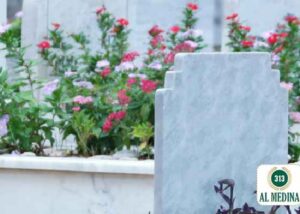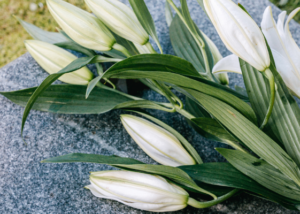Quran
Hadith
Islamic Text
بِسْمِ اللَّهِ الرَّحْمَنِ الرَّحِيمِ
In the Name of Allah Most Merciful Most Kind
Short Answer
Yes, planting a tree on a grave is allowed in Islam. However, it does not seem to be a regular Sunnah of the Holy Prophet ﷺ, so it is best not to make it a norm for every grave. However, this issue is different to the issues of: building on graves due to necessity; generally; and the building on the graves of scholars.
Hadith
عَنِ ابْنِ عَبَّاسٍ رَضِيَ اللَّهُ عَنْهُمَا، مَرَّ النَّبِيُّ صَلَّى اللهُ عَلَيْهِ وَسَلَّمَ عَلَى قَبْرَيْنِ فَقَالَ: إِنَّهُمَا لَيُعَذَّبَانِ وَمَا يُعَذَّبَانِ مِنْ كَبِيرٍ ثُمَّ قَالَ: بَلَى أَمَّا أَحَدُهُمَا فَكَانَ يَسْعَى بِالنَّمِيمَةِ، وَأَمَّا أَحَدُهُمَا فَكَانَ لاَ يَسْتَتِرُ مِنْ بَوْلِهِ قَالَ: ثُمَّ أَخَذَ عُودًا رَطْبًا، فَكَسَرَهُ بِاثْنَتَيْنِ، ثُمَّ غَرَزَ كُلَّ وَاحِدٍ مِنْهُمَا عَلَى قَبْرٍ، ثُمَّ قَالَ: لَعَلَّهُ يُخَفَّفُ عَنْهُمَا مَا لَمْ يَيْبَسَا
Ibn `Abbas (May Allah Most High be pleased with them both) said: “The Prophet ﷺ passed by two graves and said, ‘They are being punished, but not for something great.’ And then he ﷺ added, ‘Yes, one of them used to spread Nameemah (gossip) while the other did not take care in preventing urine from soiling him.’ He (Ibn `Abbas) said, then he ﷺ took a date palm stalk and split it into two pieces, then he ﷺ planted one piece on each grave and said, ‘Their punishment may be lightened whilst they remain fresh.’“(Sahih Bukhari, 1378).
In the Sahih Hadith above, we find that the Holy Prophet ﷺ planted half a date palm stalk into a grave. Further, since there is no narration to assert that this was specific to the Prophet ﷺ, it is a proof of permissibility for everyone. This permissibility was mentioned by the renowned Hanafi scholar Imam Zayn al-Deen Ibn Nujaym in his celebrated work al-Bahr al-Raiq.
Classical scholars
وَفِي الظَّهِيرِيَّةِ، وَلَوْ وُضِعَ عَلَيْهِ شَيْءٌ مِنْ الْأَشْجَارِ أَوْ كُتِبَ عَلَيْهِ شَيْءٌ فَلَا بَأْسَ بِهِ عِنْدَ الْبَعْضِ اهـ. وَالْحَدِيثُ الْمُتَقَدِّمُ يَمْنَعُ الْكِتَابَة فَلْيَكُنْ الْمُعَوَّلَ عَلَيْهِ لَكِنْ فَصَّلَ فِي الْمُحِيطِ فَقَالَ: وَإِنْ اُحْتِيجَ إلَى الْكِتَابَةِ حَتَّى لَا يَذْهَبَ الْأَثَرُ وَلَا يُمْتَهَنُ فَلَا بَأْسَ بِهِ فَأَمَّا الْكِتَابَةُ مِنْ غَيْرِ عُذْرٍ فَلَا اهـ. (البحر الرائق شرح كنز الدقائق)
In al-Dhaheeriyah (he mentioned), if he plants something like a tree upon it, or writes something on it, then there is no harm according to some. However, the Hadith that was mentioned prohibits writing. Therefore, it must be acted upon. In al-Muheet he explained saying, if there is a need to write so that the traces do not disappear, and it is not disrespected then there is no harm (in doing so). As for writing without a validating reason, it is not permitted. (Imam Zayn al-Deen Ibn Nujaym, al-Bahr al-Raiq).
Explanation
Although it is permissible to plant a tree on a grave, it is best not to make it a norm at Muslim graveyards. Firstly, this is because it was not a norm in the time of the holy Prophet ﷺ. Secondly, it will further restrict space at graveyards and could make burial difficult if there are trees everywhere at the graveyard.
And Allah Most High Knows Best.
And Allah Most High Knows Best.
–Answered by Shaykh Noorud-deen Rashid (18.04.23)






